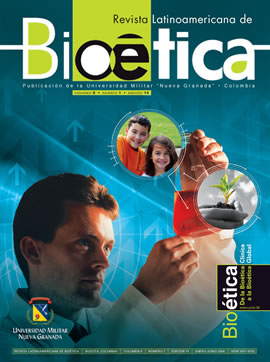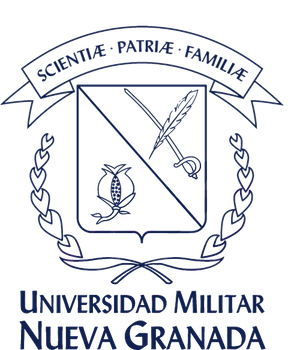Propuesta para el desarrollo de un sistema de regulación y control técnico-social de la investigación Biomédica y Biotecnológica: Caso Venezuela
Resumen
El presente artículo tiene como propósito ofrecer los resultados de una investigación que pueda ayudar al mejoramiento del sistema de regulación y control tecno-social de la investigación biomédica y biotecnológica en Venezuela. Ésta, es clave tanto para el sector de Ciencia y Tecnología como para el de Salud nacional. La percepción bioética integral en esta materia, garantiza el incremento de la efectividad y calidad en la investigación con seres humanos, ya que esta interdisciplina busca la protección integral de las personas involucradas.Descargas
Disciplinas:
Bioética, ciencias socialesLenguajes:
esReferencias bibliográficas
• AMM: Código Internacional de Ética Médica. Adoptado por la 3ª Asamblea General de la AMM Londres, Inglaterra, octubre 1949 y enmendado por la 22ª Asamblea Médica Mundial Sydney, Australia, agosto 1968 y la 35ª Asamblea Médica Mundial Venecia, Italia, octubre 1983 y la Asamblea General de la AMM, Pilanesberg, Sudáfrica, octubre 2006. Disponible en (08/02/2008).
• AMM: Principios éticos para las investigaciones médicas en seres humanos. Adoptada por la 18ª Asamblea Médica Mundial Helsinki, Finlandia, Junio 1964 y enmendada por la 29ª Asamblea Médica Mundial Tokio, Japón, Octubre 1975; 35ª Asamblea Médica Mundial Venecia, Italia, Octubre 1983; 41ª Asamblea Médica Mundial Hong Kong, Septiembre 1989; 48ª Asamblea General Somerset West, Sudáfrica, Octubre 1996 y la 52ª Asamblea General Edimburgo, Escocia, Octubre 2000. Nota de Clarificación del Párrafo 29, agregada por la Asamblea General de la AMM, Washington 2002; Nota de Clarificación del Párrafo 30, agregada por la Asamblea General de la AMM, Tokio 2004. Disponible en http://www.wma.net/s/policy/b3.htm (08/02/2008). En la actualidad continua el proceso de revisión, octubre de 2007 Disponible en http://www.wma.net/s/press/2007_9.htm (08/02/2008).
• BEECHER, H.K. (1966): “Ethics and Clinical Research”, New England Medical Journal of Medicine 274, 1354-1360.
• BERNARD, C. (1865): Introduction a Létude de la Médicine Expérimentale. JB Bailliére et fils, Paris. Trad. Introducción al estudio de la medicina experimental, Buenos Aires, El Ateneo, 1959.; Normandin S.(2007): Claude Bernard and an introduction to the study of experimental medicine: “physical vitalism,” dialectic, and epistemology. En J Hist Med Allied Sci. 2007 Oct;62(4):495-528. Epub 2007 Jun 18.
• BRENNAN, T. A. (1999): Proposed revisions to the Declaration of Helsinski. Will they weaken the ethical principles underlying human research? N Engl J Med; 341:527-531
• BRODY H., MILLER F.G. (2003): The clinician-investigator: unavoidable but manageable tension. En Kennedy Inst Ethics J.; 13(4): 329-46.
• CARDONA, R. y POLANCO VILLEGAS, M. (2005): Registro y Control de los Medicamentos en Venezuela.: Una visión histórica. INHRR, vol.36, no.1, p.43-56.
• CARRILLO SALCEDO, J. A. (2001): Soberanía de los Estados y derechos humanos. Madrid: Tecnos.
• CASSESE, A. (1995): Self-Determination of Peoples. A legal reappraisal. Cambridge: Cambridge University Press.
• CHIONG, W. (2006): The real problem with equipoise. En Am J Bioeth. Jul-Aug;6(4):37-47.
• CIOMS (1993): Normas éticas internacionales para las investigaciones biomédicas con sujetos humanos. Publicación Científica 563, Organización Panamericana de la Salud, Washington;
• CIOMS: Council for International Organizations of Medical Sciences. Disponible en http://www.bioetica.org/bioetica/cioms.htm (08/02/2008).
• CLARK, P.A. (1998): The ethics of placebo-controlled trials for perinatal transmission of HIV in developing countries. En J Clin Ethics. 9(2):156-66.
• CÓDIGO DE DEONTOLOGÍA MÉDICA (1985): Disponible en http://www.mintra.gov.ve/legal/codigos/deontologiamedica.html (8/02/2008). Aprobado durante la LXXVI reunión extraordinaria de la Asamblea de la Federación Médica Venezolana, realizada en Caracas el 20 de marzo de 1985.
• Constitución República Bolivariana de Venezuela. Publicada en Gaceta Oficial Extraordinaria N° 5.453 de la República Bolivariana de Venezuela. Caracas, viernes 24 de marzo de 2000. Disponible en http://www.tsj.gov.ve/legislacion/constitucion1999.htm (09/08/2008)
• DANILENKO, G. M. (1991): International Jus Cogens: Issues of Law-Making. Disponible en http://www.ejil.org/journal/ Vol2/No1/art3.html#P13_28.
• DHAI, A. (2005): Research ethics review-protecting participants in research. En S Afr Med J 95 pág. 595-597.
• EMANUEL, E.J., WENDLER D., KILLEN J., GRADY C. (2004): What makes clinical research in developing countries ethical? The benchmarks of ethical. En J Infect Dis 189.
• Federación Europea de Biotecnología: http://files.efbpublic.org/downloads/The_Application_of_Human_Genetic_Research_Spanish.pdf (08/02/2008)
• FREEDMAN B. (1987): Equipoise and the ethics of clinical research. En N Engl JMed. 317:141-5.
• FRIES J.F., KRISHNAN E. (2004): Equipoise, design bias, and randomized controlled trials: the elusive ethics of new drug development. En Arthritis Res Ther. ;6:R250-5.
• GARRAFA, VOLNEI; LORENZO,CLÁUDIO (2007): Ética e investigación clínica en los países en desarrollo: Aspectos conceptuales, técnicos y sociales. Materiales del Programa de Educación Permanente a Distancia. Red Bioética-UNESCO.
• HABERMAS, J. (1989): Soberanía popular como procedimiento. Conferencia dictada en México en el Simposio que se realizó con motivo de su visita en 1989, p.21.
• HAWKINS, J.S. (2006): Justice and placebo controls. En Soc Theory Pract. Jul;32(3):467-96;
• Health Information and Record Services – Policies and Procedures Duke University Hospital. Disponible en http://hirs.mc.duke.edu/ recserv.nsf/web/policies +and+procedures (10/02/2008).
• Health Insurance Privacy and Portability Act, Acta de Privacidad y Portabilidad del Seguro Médico) se viene modificando desde el 2001.
• HEGEL, W.F.G. (1960): La Fenomenología del espíritu. México: FCE. Junta Revisora de Productos Farmacéuticos. Reglamento de Investigación en farmacologia Clinica. Version actualizada en Septiembre 2.004. Instituto Nacional de Higiene Rafael Rangel. Caracas.
• KUKLA R. (2007): Resituating the principle of equipoise: justice and access to care in non-ideal conditions. En Kennedy Inst Ethics J. 17(3):171-202;
• LENZER J. (2008): US Congress and European Research Council insist on open access to research results. En BMJ. Jan 26; 336(7637):176-7;
• Ley de Ejercicio de la Farmacia (LEF, 1928); publicada en Gaceta Oficial de la República de Venezuela Nº 16.551 de fecha 07 de julio de 1928. Disponible en http://www.mipunto.com/venezuelavirtual/leyesdevenezuela/ordinarias/leydeejerciciodelafarmacia.html (08/02/2008).
• Ley del Ejercicio de la Medicina (LEM, 1982): Gaceta Oficial de la República de Venezuela nº 3.002 Extraordinario, Caracas, 23 de agosto. Disponible en http://www.gobiernoenlinea.ve/ocMgr/sharedfiles/261.pdf (08/02/2008).
• Ley Orgánica de Ciencia, Tecnología e Innovación (LOCTI, 2005): Publicada en Gaceta Oficial N° 38.242 de fecha 03 de agosto del 2005. Disponible en http://www.mipunto.com/venezuelavirtual/leyesdevenezuela/leyesorganicas/leyorganicadecienciatecnologiaeinnovacion.html (08/02/2008).
• Ley Orgánica de Salud (LOS, 1998): Publicada en Gaceta Oficial N° 36.579 de fecha 11 de Noviembre de 1998. Disponible en http://www.mipunto.com/venezuelavirtual/leyesdevenezuela/leyesorganicas/leyorganicadesalud.html (08/02/2008).
• Ley Orgánica del Sistema Venezolano para la Calidad (LOSVC, 2002). Gaceta Oficial de la Republica Bolivariana de Venezuela nº 37555 del 23 de octubre de 2002.
• Ley Orgánica para la protección del Niño y del Adolescente (LOPNA, 1998). Publicada en Gaceta Oficial Nº 5.266 (Extraordinaria) de fecha 2 de Octubre de 1998. Disponible en: http://www.mipunto.com/venezuelavirtual/leyesdevenezuela/leyesorganicas/leyorganicaparalaprotecciondelnino.html (08/02/2008).
• LOLAS F. (1994): Medical praxis: an interface between ethics, politics, and technology. En Social science & medicine; 39: 1-5.
• LOLAS, F. y Quezada, A. (2003): Pautas éticas de investigación en seres sujetos humanos: Nuevas perspectivas. Programa Regional de Bioética OPS/OMS.
• LONDON A. J. (2001): Equipoise and international human-subjects research. En Bioethics. Aug;15(4):312-32.
• LONDON A. J. (2006): The moral foundations of equipoise and its role in international research. En Am J Bioeth. 6(4):48-51; discussion W42-5;
• LONDON A. J. (2007): Two dogmas of research ethics and the integrative approach to human-subjects research. En J Med Philos. Mar-Apr; 32(2):99-116;
• LONDOÑO, J. L. y FRENK, J. (1997): Pluralismo estructurador: Hacia un modelo innovador para la Reforma de los Sistemas de Salud en América Latina. Washinton; BID, Doc. Trab. Nº 353.
• LURIE P., Wolfe S. M.(1997): Unethical trials of interventions to reduce perinatal transmission of human immunodeficiency virus in developing countries. N Engl J Med;337:853-856;
• MARSHALL P. A.: Public Health Research and Practice in International Settings: Special Ethical Concerns Disponible en http://www.asph.org/UserFiles/Module3.pdf (12/02/2008).
• MILLER F. G., BRODY H. (2007): Clinical equipoise and the incoherence of research ethics. En J Med Philos. Mar-Apr;32(2):151-65;
• Miller F.G., Brody H. (2002): What makes placebo-controlled trials unethical? En Am J Bioeth. Spring;2(2):3-9.
• National Commission for the Protection of Human Subjects of Biomedical and Behavioral Research (1983). Belmont Report: ethical principles and guidelines for the protection of human subjects of research. Washington, DC: Government Printing Office;
• Nuffield Council on Bioethics. The Ethics of Research Related to Healthcare in Developing Countries. Follow-up paper. Disponible en http://www.nuffieldbioethics.org/go/ourwork/developingcountries/page_246.htm (08/02/2008).
• Organización Panamericana de la Salud, Washington; Rothman, D.J. (1982): Were Tuskegee & Willobrook ´studies in nature? Hastings Cent Rep.;12(2):5-7.
• PELLEGRINI A, MACKLIN R (Editores) (1999): Investigación en sujetos humanos: Experiencia internacional. Serie Publicaciones (1999).
• PENCHASZADEH, VICTOR B. (2007): Organización institucional e investigación en genética. Materiales del Programa de Educación Permanente a Distancia. Red Bioética-UNESCO.
• PENCHASZADEH, V. B. (2002): Ética de las investigaciones biomédicas en poblaciones humanas. Rev Cubana Salud Pública, vol.28, no.2, p.149-156.
• SCHMIDT, L. (2007): La Dignidad Humana como fundamento de la Biopolítica y el Derecho. Cap. 13: Consentimiento ciudadano. Mimeo a ser publicado.
• SCHMIDT, L. (2007): La Dignidad Humana como fundamento de la Biopolítica y el Derecho. Cap. 13: Consentimiento ciudadano. Trabajo de ascenso a Profesor Titular. Mimeo a ser publicado.
• SCHMIDT, L. (2007): La Bioética en la Reforma de los Sistemas de Salud En Memorias del Congreso en Conmemoración de los 50 años de FLACSO; FLACSO: Quito, del 29 al 31 de octubre.
• VARMUS H, SATCHER D. (1997): Ethical complexities of conducting research in developing countries. En N Engl J Med. Oct 2; 337(14):1003-5.
• W.AA.; Genómica y Farmacogenómica Fundación José Cáceres Gil (Real Academia de Farmacia) en http://www.ranf.com/pdf/funda/genomica.pdf;
• WEIJER C., SHAPIRO S. H., GLASS K. C. (2000): For and against: clinical equipoise and not the uncertainty principle is the moral underpinning of the randomized controlled trial. En Br Med J.; 321:756-8.
• WEIJER C., Shapiro S. H., Glass K. C., et al. (2000): For and Against: Clinical equipoise and not the uncertainty principle is the moral underpinning of the randomized controlled trial for against. BMJ; 321: 756-758.
• World Health Organization Siglas en español: OMS (Organización Mundial de la Salud). Disponible en http://www.who.int/tdr/publications/publications/pdf/ethicssp.pdf (08/02/2008).












